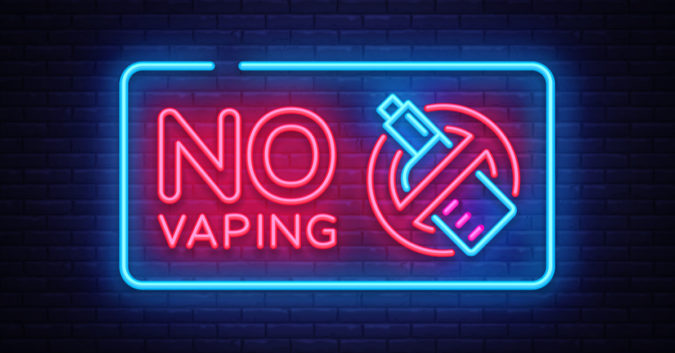The tone of government officials regarding vaping amidst the COVID-19 pandemic has ratcheted up in severity.
Recently, the U.S. House Oversight Committee sent a letter to the U.S. Food and Drug Administration (FDA), urging it to “clear the market” of e-cigarettes for the duration of the outbreak.
While scientists are still uncertain about the link between vaping and the severity of COVID-19 cases, there is cause for concern. Health experts point out that both vaping and smoking damage the lungs and compromise their ability to fend off infection.
This could be the reason for what appears to be an upswell of young patients who have been admitted to hospital ICUs.
Vaping Is Its Own Epidemic
Vaping is very popular among young Americans, particularly those in their teens and twenties. In China, reported deaths appear to have impacted men far more than women, but smoking is far more common among men than women.
That could explain why the COVID-19 mortality rate initially seemed to target men. Regardless, officials are considering every angle, which is why the House of Representatives’ main investigative committee is urging the FDA to curtail or ban vaping products until the pandemic has passed.
“Allowing e-cigarettes to remain on the market during this period would harm children and adults throughout the country and exacerbate the coronavirus crisis in critical ways,” wrote U.S. Rep. Raja Krishnamoorthi (D-IL), chairman of the Subcommittee on Economic and Consumer Policy. “Reducing the number of smokers and vapers that fall ill with coronavirus will not only help them but the entire health system.”
To Ban or Not to Ban?
For its part, the FDA has been slow to take on the epidemic of youth vaping, despite plans last fall by the Trump administration to ban flavored e-cigarettes outright.
The government has since adopted a policy of allowing any and all vape products to remain on the market following an official application submitted to the FDA. E-cigarette manufacturers need only to demonstrate that their products meet certain public health standards.
That policy went into effect in February, but last week the FDA asked a federal court to delay the process by 4 months — a boon for the vaping and tobacco industries, which would prefer to expand the window of premarket review.
If adopted, the delay would give e-cigarette makers until Sept. 9th, rather than May 12th, to submit applications to keep vaping products, including flavored ones, on the shelves.
The FDA request contrasts with that of the House subcommittee led by Rep. Krishnamoorthi, who has urged the FDA to suspend all application approvals of vape products, and to “commit to immediately clearing the market of all e-cigarettes by prioritizing enforcement against them.” Krishnamoorthi continued,
“FDA has both the authority and an obligation to start enforcing the law against all e-cigarettes in order to protect the public health. Vaping will add to the stress on our hospitals as more people take up intensive care beds and require ventilators and other critical equipment. Eliminating the preventable accelerant of vaping is a public health necessity.”
A press release from the House subcommittee pointed to research further tying smoking and vaping to severe COVID-19 cases. A February paper published in the New England Journal of Medicine found smokers made up twice the percentage of COVID-19 patients who required medical ventilation, intensive care treatment, or who died.
All this is playing out as hospitals face severe shortages of beds, personal protective equipment (PPE), and essential medical supplies. These shortages are expected to exacerbate a ballooning of COVID-19 cases in the coming weeks.
As of April 20, 2020, there are currently more than 750,000 confirmed cases in the U.S. and more than 41,000 deaths.
